Chapursan – The Land without Sunshine
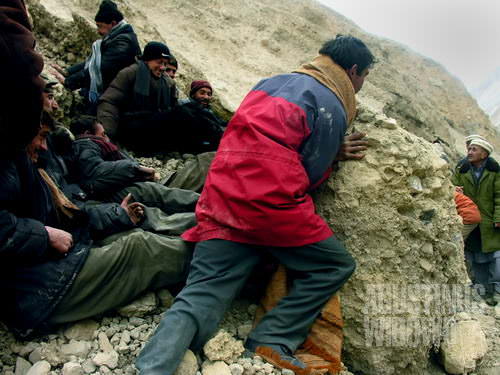
The difficult journey to the land without sunshine
January 4-7, 2006
Have you heard about the land without sunshine? It was a cloudy morning when someone in Sust bazaar – just one step more to China – told me. “You should go to Chapursan, over there, there is no sunshine for 2.5 months!” Chapursan is up north from Sust, going parallel with the Afghan border. And for harsh winter like this, nobody goes there due to the low temperature, harsh wind, and of course no sunshine. The last part of the challenges really made me decided to depart.
There are several cars departing from Sust bazaar. There is no exact departure time, all departures are depended on passengers. Noor Khan – a Chapursan native who have been living in Karachi since student time, and Aziz – a teacher, Noor’s relative, also have been living in Karachi, are my fellow passengers. They told me many things about the culture of Wakhan Tajik – the native of the valley, about the land without sunshine – incidentally the exact valley without sunshine is about the breathing distance from their houses, about interesting event that I can catch the day later – a traditional funeral, etc etc.
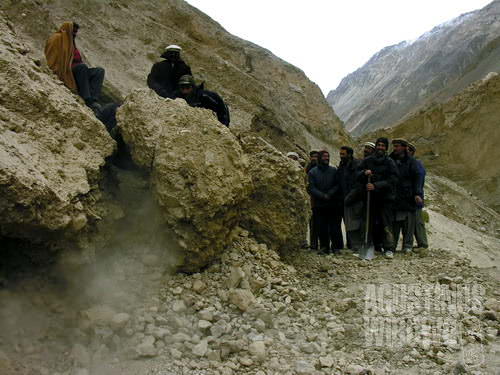
They say this journey will make you closer to God
The road to Chapursan is a deadly 4 metres wide, just between mountains and cliff. No car can pass the others, but our jeep driver drove as he was in Formula-1 competition. Meanwhile, two huge rocks blocked the road. Landslide. There are already 3 jeeps in front of us, and the male passengers work together to remove the gigantic rocks. About half a dozen men laying on the road, kicking the rocks with their legs. And the others pushing hard. Finally the rocks were removed, and the sound produced when the rocks reached the frozen river down there (about 30 meters away) was scary.
It was almost dark already when we reached Aziz’s house. I decided to go with Aziz, as I think it would be very interesting to experience the funeral, and Aziz said I should go with someone. The Tajik house, built by dried mud in a box shape, is very simple from outside. But it’s indeed a very nice shelter, warm and friendly. The size is not big, and everybody gather in the house. As we all might know, the families in Pakistan are usually extended families under the same roof, and a couple may have up till 15 children. In the middle of the hall, there is a stove, fireplace, and chumney to expose the gas. The cooking was done in this hall, and there is another separated kitchen to prepare more complicated meals. The guests are entertained around the stove, which is very warm. Females and males are always separated. The guest place, is indeed a male’s talk area, while the women (Aziz’s mother, sisters, sisters-in-law, daughters, nieces, etc) and children is on the other side. The very same hall is also the place of them sleeping, dancing (when there is a party, and only men dance, women only dance in front of women), reading, eating, chatting, gathering, etc. In a word, all of the activities of live, except bathing and toileting, are done in this very same room.
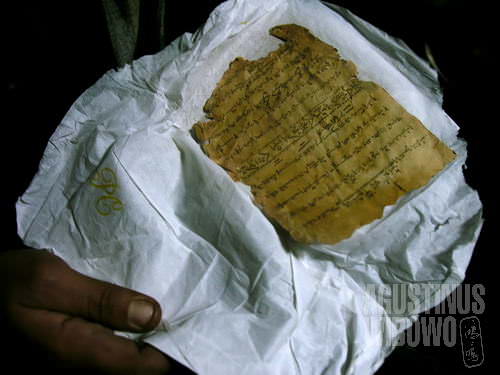
Can I read this Buddhist script? Of course, not.
Later I found that Noor Khan and Aziz were relatives. At first they were friend, but then Aziz was married to Noor’s sister. I was dropped in Aziz’s cousin house, as Aziz said he would take me around the village as this cousin is a wonderful travel guide. Travel guide? As he saw I was worrying, he laughed and said, “no worry, you are our guest!”
So here is Aziz’s cousin, to be exact, the son of Aziz’s younger sister, as relationship is always described very detailed in Urdu. His name is Majeed, a young guy of 22. Her mother, Aziz’s sister, prepared dinner of potato and meat. The Tajik fried paratha, called chelpek, is indeed a nice companion to the salty milk tea. Indeed, they put salt instead of sugar to the milk tea. The family also played a traditional music song with rebab and piano, specially for me. ![]() I will described later about the traditions and lifes of the Wakhi Tajik people in a detailed article.
I will described later about the traditions and lifes of the Wakhi Tajik people in a detailed article.
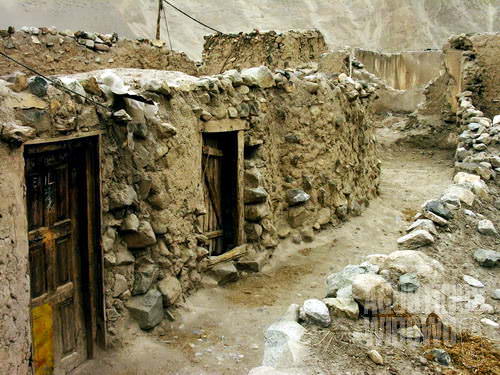
No sunshine…
I was brought to Aziz’s uncle to sleep. His uncle, Amir, an Ismaili – as most of people in this area, has a very interesting humour. Describing himself as non religious, he pretended to be a Taliban supporter with the funny arguements. Bas, here I also heard many interesting stories about the valley. From a girl who did operation to be a man (yes, in the ISlamic Republic of Pakistan!!!), until the rumour that Mao Zedong was Muslim. I will try to re-check the accuracy of these rumours.
The second day, Amir woke up very early. At 7 the sky was still dark and the wind was very harsh. He said that he was going to do a special Taliban duty, to slaughter 4 Americans and 3 Malaysians. I decided to continue sleeping. Later on, I found that he was going to attend that very traditional funeral ceremony I was supposed to go. It was held very early in the morning, in a village about 15 kms away. So I missed the funeral.
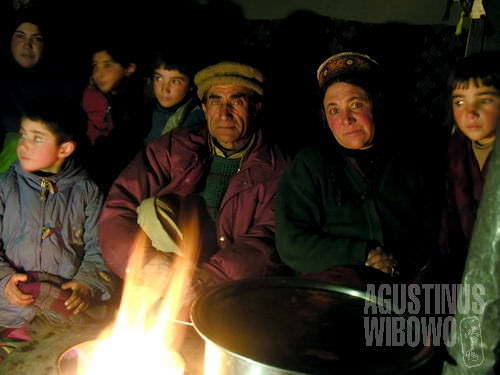
and no electricity
Instead Majeed and I did some walking to Rasyed, about 4 kms away, passing thru the valleys where the sun never rises. There was a school, but due to the absence of sun and snowslides, the school was about to move near Majeed’s house. In Rasyed he has a sister (it seems that everyone is every other one’s relative…. no wonder, 10 children on average in one family). The wind was really stark, so her house was indeed a refreshing oasis. Aziz didnt really remember the age of her sister, but fortunately he still remember her name.
The wind was really harsh, and the sky was dark. Every boy was heading behind the thick coat and shawl. But the curious eyes to see strangers were indeed noticable. And after struggle of walking against the wind, crossing the frozen rivers, and also to resist the temptation of taking pictures of every single boy, we reached the village of Majeed again. In Keel, I was taking picture of a boy, then we were invited to his house. The grandmother even prepared meat for our meal, but we refused politely. This family, again, is a far relative of Amir, working in Islamabad to a Chinese boss, whom he doesnt like.
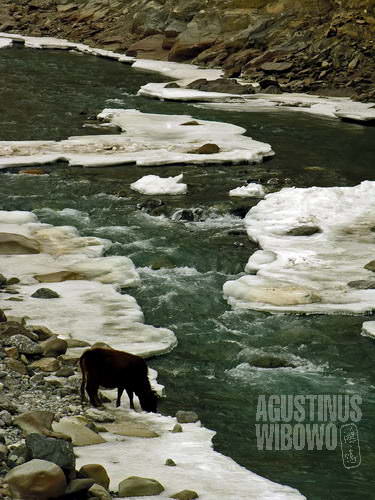
Freezing
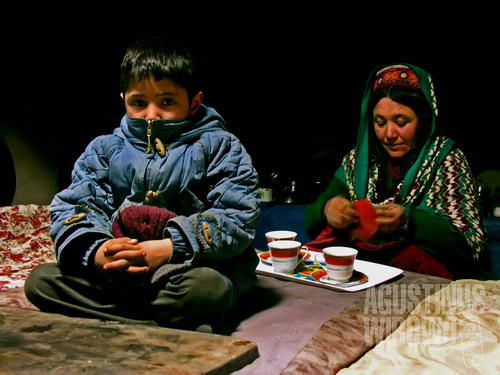
A warm morning in cold valley
Back again to Majeed’s house, we were prepared to leave Charpusan valley to go back to Sust the day after. Actually Majeed had to go to Sust today, but as he had a sudden guest (someone who was thrown away to him by his uncle – that is me), he delayed his work for a day. And during my stay here I had got free lodgings and free meals, not what I expected though. And the most interesting part is the genuine Wakhi Tajik family experience. This is indeed Pakistani hospitality. I feel lucky that I can speak Urdu enough to gather many stories of their life.
The journey back to Sust is a crazy 1 hour drive. normal time needed for the track from Keel is 2 and half hours, but the drivers were racing to be the first to arrive in Sust in order to get passengers, so they did really race in 4 metre wide mud road just next to the cliff. I was made really close to my God. Later in Sust, in another Wakhi Tajik’s friend’s house, I enjoyed yak meat for my dinner….. yummy.



The family also played a traditional music song with rebab and piano, specially for me>>
Wihh… Sampeyan di terima sekali di sana ya!